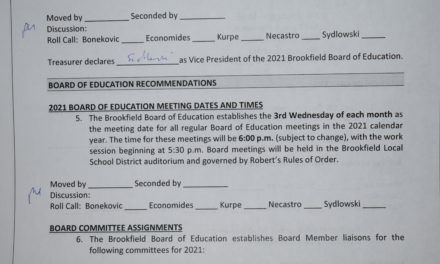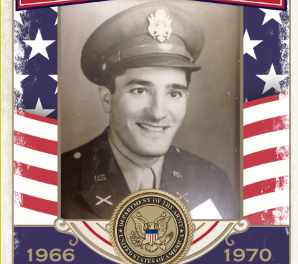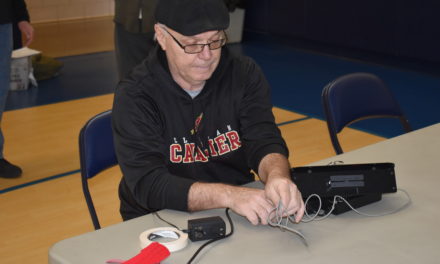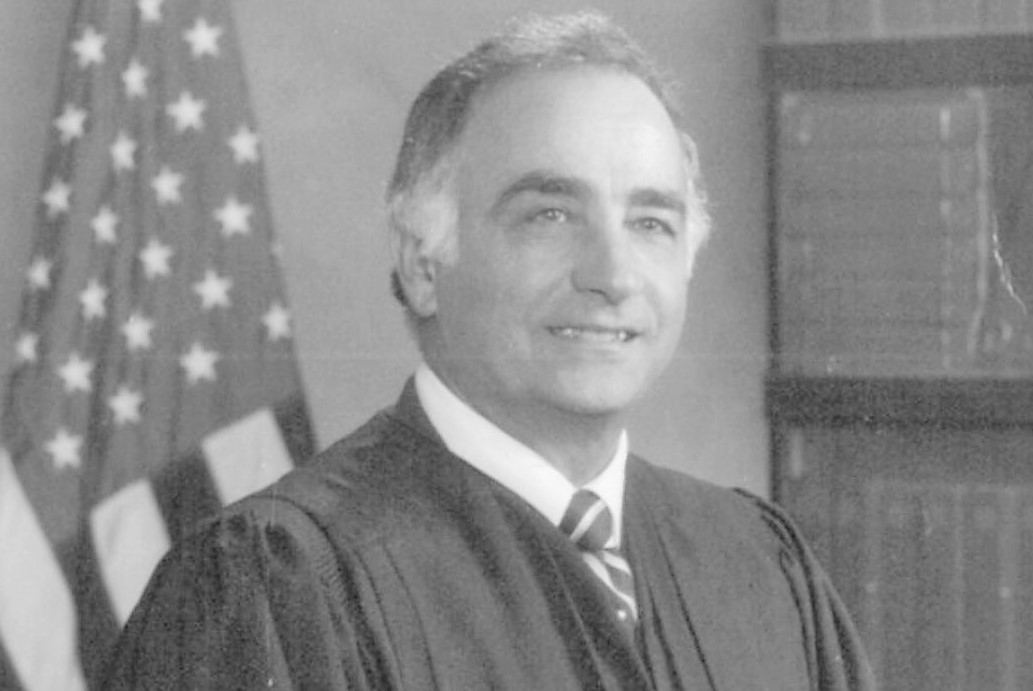
Judge Ray J. Rice-contributed photo
Editor’s note: This is the final story in a series on the inductees into the Brookfield Distinguished Alumni Hall of Fame. Previous stories can be read at newsonthegreen.com
Teresa Rice Daugherty said her father, the late Judge Ray J. Rice, stressed to her and her siblings that they were responsible for their own destinies.
“One of the things that he always taught the four of us growing up was that no one can tell you who you are going to be, no one can limit you and only you can determine where you are going, what you will do and who you will become,” she told a group of Brookfield High School students in an assembly Sept. 20.
Rice was a living example of that advice, the son of Lebanese parents who found himself supporting his family while still in high school, and through his service in World War II.
Rice worked his way through law school with significant assistance from the dairy farmgirl he married, the former Doris E. Lohr, and became a pillar of the Trumbull County community.
Rice was born April 8, 1925, in Cambridge, Ohio to Naseeb and Theresa Thomas Rice. His father was born in Syria and his mother in Youngstown, but she had spent most of her childhood in Lebanon.
“My grandfather was an iron mill worker (in Cambridge) at that time,” Daugherty said. “He did not read, nor write English, and his spoken English was very broken.”
The family moved to a relative’s farm in Oxford, Mich., where Rice attended his first two years of school, then to Farrell, where Rice was made to repeat second grade at St. Ann’s School, and back to Oxford.
In 1940, the family settled in Masury, moving into a home on Ulp Street. Rice’s parents got jobs at George and Thomas Cone Co. on Brookfield Avenue at Ulp, a company started by relatives of Theresa Rice. The company is now known as Joy Cone Co. in Hermitage.
Rice started at Brookfield schools in the eighth grade. In high school, Rice played end on the football team, percussion in the band and orchestra, was a male cheerleader, and met Doris, who lived on a farm on Warren Sharon Road.
“He talked about his days in high school with great joy and he talked about how they had so much fun because at lunchtime they all danced, and I think that’s where he developed his love of the jitterbug,” Daugherty said.
“In 1943, the cone factory caught fire and burned down,” she said. “My grandparents found themselves without a job. Because my father was 18, even though he was a junior in high school, he had to go to work to help support the family. My grandparents had difficulty getting jobs because of their lack of reading and writing English. There’s a gentleman from Brookfield (Delvey Reno) who was manager at a mill in Pennsylvania, and he hired my father and two other gentlemen, who also were 18-year-olds, to work in the mill. My dad would get up, go to school, he would get out of school a little early, he and these two gentlemen would drive to the mill and work the afternoon shift, from 3 in the afternoon to 11 o’clock at night. He would come home, he said he would study until he fell asleep, get up, go to school, and repeat that every day.”
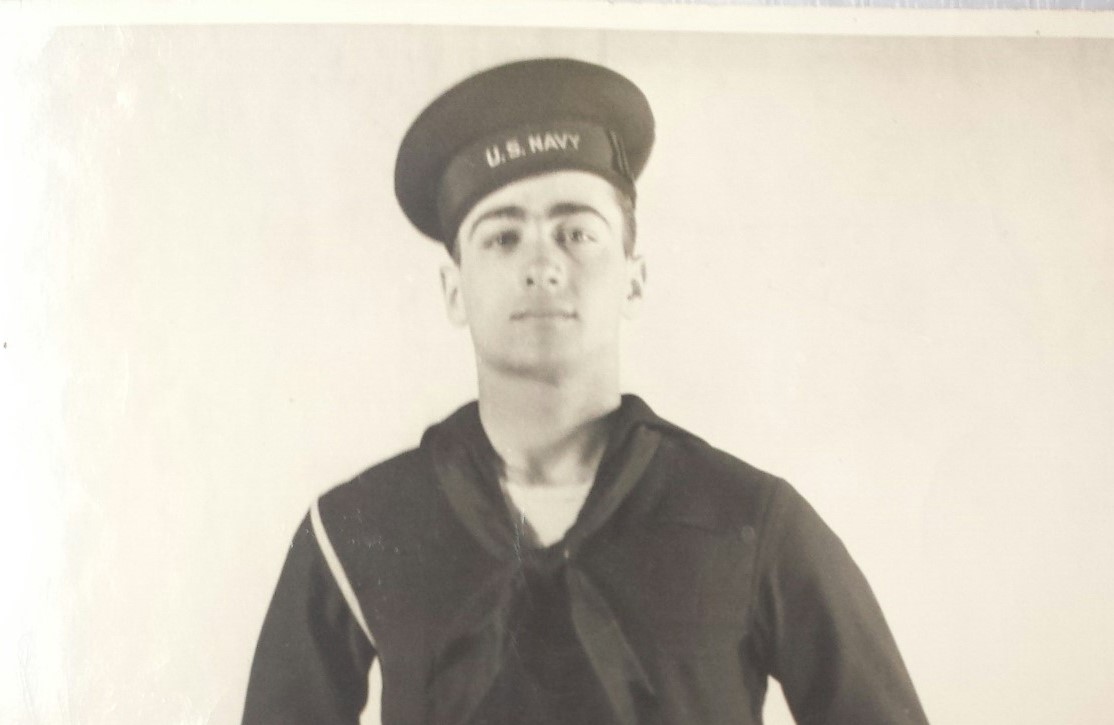
Judge Ray J. Rice-contributed photo.
Rice was drafted during his senior year, joining the Naval Air Force, becoming a top turret gunner on a torpedo plane, machinist’s mate and instructor for turret gunners, Daugherty said. After Rice completed aviation mechanics school, that achievement was deemed sufficient to meet his high school requirements, and he received a diploma from Brookfield High School.
“His entire (military) pay was sent home, because he was the sole support of his family,” which included three younger siblings, Daugherty said. Rice would make grilled cheese sandwiches to sell to fellow sailors, and wash their uniforms, so he would have spending money, she said.
Rice was discharged in 1946 and moved to Detroit, where his family had relocated. “He worked as a drill press operator with his grandfather at a local mill while making arrangements to go to college,” Daugherty said.
Rice and Doris eloped on May 25, 1946, getting married in Detroit. Rice had just been accepted to attend Kent State University, so the newlyweds moved to Windham. He worked part-time jobs building bicycles and selling insurance while his wife worked full time as a secretary and typist. “He did that because he wanted to save his GI benefits to use them to go to law school,” Daugherty said.
Rice was accepted into law school before he completed his studies at Kent, and was allowed to forgo his final year at Kent, which awarded him his undergraduate degree after he had completed a year of law school. He attended Franklin Thomas Backus School of Law at the Western Reserve University in Cleveland, now Case Western Reserve University, and passed the bar exam in 1951.
Setting up a practice in Hubbard with Mary Hummell, when female attorneys were rare, his first client stiffed him. Yet, he built up a successful practice and eventually bought what is now the Rice Law Office building at 48 W. Liberty St., near his old office, from which Daugherty, also a lawyer, still practices.
 Rice was defeated in his first attempt to be an elected county court judge, but was named acting justice in 1960 when the man who defeated him, Frank Neal, took ill, and was appointed to the position after Neal died. Rice never lost another election, holding the office until he died in 1992.
Rice was defeated in his first attempt to be an elected county court judge, but was named acting justice in 1960 when the man who defeated him, Frank Neal, took ill, and was appointed to the position after Neal died. Rice never lost another election, holding the office until he died in 1992.
Rice served in a now-demolished court building on Warren Sharon Road – sometimes proceedings were interrupted by errant golf balls from Yankee Run Golf Course that crashed through the court’s windows. His son, Ronald J. Rice, later served the same position and has since been elected a Trumbull County Common Pleas Court Judge.
“He was a unique man because of his background, because of his upbringing,” Daugherty said. “He was a very humble man. He knew what it was like to grow up in humble beginnings, and he respected everybody who came before him. People who came before him in court walked away feeling respected. Some experienced some unexpected compassion, and almost everybody learned something about the law and the life of this seasoned jurist. He was a gentleman and he was admired for his sense of character, his sense of humor, his ethical professional standard and his love of the law and of life.”


